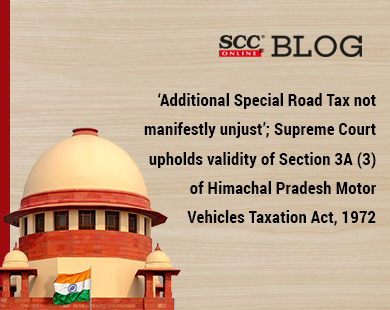Supreme Court: In an appeal against Himachal Pradesh High Court declaring Section 3A (3) of Himachal Pradesh Motor Vehicles Taxation Act, 1972 as ultra vires the State powers while quashing two other notifications in this regard, the bench of Sanjay Kishan Kaul, Abhay S. Oka and Vikram Nath*,, JJ. upheld the validity of the said provisions and set aside the High Court’s judgment.
Delving into the background of the instant matter, the Public Transport Operators challenged the validity of Sections 3-A, 3-C, 4-A, 5-A and Schedule-III under Section 3-A introduced vide the Himachal Pradesh Motor Vehicles Taxation (Amendment) Act, 1999 and further notifications alleging the same being ultra vires the Constitution of India. The High Court upheld the validity of all the Sections except Section 3A (3) and two of the notifications and struck down the decision dated 1-1-2000 which was based on negotiations relating to Special Toll Tax, which has been appealed against by the State of Himachal Pradesh in the present matter.
Following the previous track of a similar matter as noted by the Court, the Rajasthan High Court had disregarded the imposition of tax as a fine under Section 4-B (3) of Rajasthan Motor Vehicles Taxation Act, 1951 and held the same being ultra vires the powers conferred on the State Legislature under Entry 56 of List II of the Seventh Schedule to the Constitution of India. The same was challenged before the Supreme Court and referred to a three judges’ bench. However, the Civil Appeal No. 10457 of 1995 was dismissed vide order dated 15.04.1998 because of similar provisions enacted in the State of Rajasthan which were repealed by the Rajasthan Finance Act, 1977. Thus, the question raised in the said appeal was left open.
The Court noted the relevant provisions in the instant matter, i.e., Article 246 for division of subject matters between Union and State Legislature, Article 254 specifying the effect of inconsistency between Central and State laws, Entry 35 of the concurrent list having subject for mechanically propelled vehicles and levy of tax.
For specifically dealing with the validity of Section 3A (3) of the 1972 Act while relying upon the above-mentioned rulings, the Court framed three issues and decided accordingly:
Issue 1 – Whether it is manifestly unjust or glaringly unconstitutional?
The Court noted that “Courts must show judicial restraint to interfere with tax legislation unless it is shown and proved that such taxing statute is manifestly unjust or glaringly unconstitutional.” The Court relied on R.K. Garg v. Union of India, (1981) 4 SCC 675, Bhavesh D. Parish v. Union of India, (2000) 5 SCC 471 and Indian Oil Corpn. Ltd. v. State of Bihar, (2018) 1 SCC 242, unanimously suggesting that laws for economic activities/policy should be viewed with greater latitude as compared to those touching upon civil rights.
The Court held that “In the absence of any principles having been laid down by the Parliament, no fault could be found in the law enacted by Legislature of the State of Himachal Pradesh.” The Court also pointed out that nothing on record indicts the offending provision being manifestly unjust or glaringly unconstitutional, and that, the same was regulatory in nature and thus, within the competence of the legislature of State of Himachal Pradesh.
Issue 2 – Whether it is regulatory or compensatory in nature?
The Court considered the State’s contention that a sizeable part of budget is allocated for construction, development, repair, upkeep and maintenance of roads and bridges being a hilly state for which, special road tax was introduced and held the provision as being clearly compensatory in nature. The Court relied on State of U.P. v. Sukhpal Singh Bal, (2005) 7 SCC 615 wherein it was held that the charging of tax or additional tax along with penalty where transport vehicles were found plying in Uttar Pradesh without payment of tax or additional tax under the said Act was valid for being regulatory and compensatory in nature. The Court considered a similar issue in Sharma Transport v. Govt. of A.P., (2002) 2 SCC 188 and held that as per Entry 35 of List III of the Constitution, the permission is to lay down the principles for tax levy, whereas the State had a right to levy such tax.
Issue 3 – Whether there is any repugnancy with the provisions in the Central enactment?
Referring to the division of powers under Entry 35 of List II of the Constitution of India, the Court noted that the Central enactment has not laid down any principles for tax levy. Thus, in the absence of a central law laying principles for levying tax, no repugnancy could be alleged against the State legislature being empowered to levy taxes not only under Entries 56 and 57 of List II but also to lay down the principles under Entry 35 of List III.
The Court also clarified that the punishment for an offence, hints toward the object to create deterrence and fear in the mind of offender, the same being applicable through additional special road tax against the transport operators plying vehicles without permit.
The Court set aside the High Court’s order and held that the validity of Section 3-A(3) of the Act has been wrongly decided as ultra vires by the High Court. The Court clarified that the tax imposed is regulatory in nature and not a penalty. Regarding the notifications quashed by the High Court against lumpsum taxes, the Court relied upon State of T.N. v. M. Krishnappan, (2005) 4 SCC 53 wherein, levy of lumpsum taxes has been upheld by the 3-judge bench.
[State of H.P. v. Goel Bus Service, 2023 SCC OnLine SC 46, decided on 13-01-2023]
Advocates who appeared in this case :
For Appellant State: Advocate on Record Abhinav Mukerji;
Amicus Curiae for Respondents: Senior Advocate Siddharth Bhatnagar.



